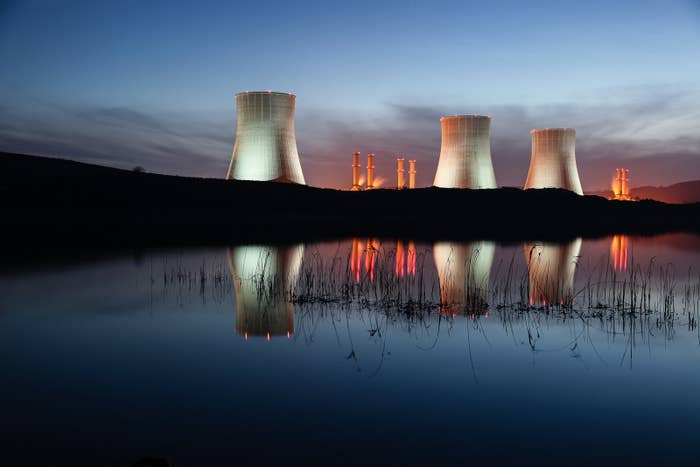
Whether or not MPs vote to stay in Euratom, the European nuclear regulator, probably doesn't matter, according to several lawyers and a high-ranking European politician.
This means Britain will have to make new arrangements or face a cliff edge in March 2019 when all its legal arrangements concerning nuclear material, industry, and research will end, with potentially devastating results. Lawyers have told BuzzFeed News it's extremely unlikely the necessary new agreements will be in place in time for the March 2019 deadline.
There has been some suggestion that British MPs will vote against the decision to leave Euratom, and that there may be sufficient support in the Commons – with Labour, the Lib Dems, the SNP, the Greens, and several Tory rebels in favour of staying in the regulator – for such a vote to be won:
Euratom rebels increasingly confident in the end govt will back down on this - they're sure they have the numbers t… https://t.co/4Dm2DkFeOk
In a debate this morning in parliament, Albert Owen, the Labour MP for Ynys Mon, said there was "contradictory legal advice" on the matter, but according to evidence he had heard on the business, energy and industrial strategy select committee it is "not essential" to leave Euratom at the same time as leaving the EU.
However, Martin Selmayr, the chief of staff to Jean-Claude Juncker, the president of the European Commission, has said on Twitter that Brexit secretary David Davis was "right" when he said triggered Article 50 required leaving Euratom:
@MartinSelmayr thanks for replying. what do you think of this argument made by David Davis?
@josephmdurso He is right.
And three senior lawyers with extensive knowledge of European and nuclear law told BuzzFeed News that while the legal question might not be settled, it was difficult, practically speaking, to see a way Britain would leave one without leaving the other. The decision to leave Euratom is most likely no longer in British hands, and possibly never was.
"In reality we couldn’t have triggered Article 50 without leaving Euratom as well," Catherine Barnard, a professor of EU law at the University of Cambridge, told BuzzFeed News. That's because Article 106a of the Euratom treaty makes it clear that several EU treaty provisions, including Article 50, apply directly to Euratom as well as the EU.
"Even if [MPs] voted to reverse the decision to authorise the PM to leave the EU and Euratom," she said, "which they gave when they approved the Article 50 withdrawal bill, there are two major problems. One, we've said we're leaving and Article 50 makes no provision for changing your mind. And two, Euratom membership is intimately linked to EU membership through shared institutions" – such as the parliament and council of ministers.
Paul Bowden, a partner at the law firm Freshfields Bruckhaus Deringer and programme leader of the International School of Nuclear Law at the University of Montpellier, told BuzzFeed News that legally, "I don't believe that there is a clearly settled answer."
Practically, however, he said that doesn't matter, because Theresa May's letter triggering Article 50 in March made it clear Britain would also leave Euratom. So the legal question of whether it would have been possible has been bypassed. The two have been triggered together, that has been accepted by the European bodies, and "I don’t think there can be any serious legal question as to the validity of the Article 50 notice insofar as it applies to Euratom."
If both Britain and the remaining 27 EU members wanted to revoke the Article 50 notice, or the part of it that applied to Euratom, that might happen, but Britain can't do it unilaterally. "With willing partners anything is possible," said Bowden, "although that would require very careful negotiation in its own right. But I don't think the 'oh we've changed our mind, we didn't mean it' option is available."
And there is no realistic way that the necessary agreements will be in place in time for March 2019, when Britain finally leaves. "No! It's not realistically possible," Barnard said emphatically. "If we were just doing this and nothing else, maybe. But even then it involves major infrastructure issues, and we're dealing with dangerous stuff. And it's being done in amongst all the other activities that need to be done."
She also pointed out that in fact we have much less time than that anyway. "The EU parliament would need to sign off on any deal," she said. "And they say they need several months to do it. So negotiations will have to be done by September 2018. We've actually only got just over a year."
It is "critical", however, that some sort of deal is reached, according to Bowden, in order to meet the UK's commitments under international law to things like the Nuclear Non-Proliferation Treaty and the International Atomic Energy Agency. "I find it very difficult to see how the UK can continue to meet those obligations without a very strong continuing measure of equivalence between our regulatory standards and those of Euratom," he said.

A possible model might be associate membership, although the obvious existing model – Switzerland's – largely only deals with research, and Britain's would have to go much further. "The vast majority of movement [of nuclear materials] within the EU and around the world is sealed radioactive sources," of the kind used in medical equipment such as X-ray and radiotherapy machines. "If we cease to be a member of Euratom the special rules that apply to facilitate the movement of these materials will not apply to us," meaning that new medical devices, and similar ones used in industry and agriculture, could be held up at the border.
Bowden said that some sort of transitional agreement, pushing Britain's Euratom leave date further back to allow us enough time to get more permanent deals, is possible, and it doesn't have to be on the same timescale as leaving the EU.
"There’s no question at all that withdrawal from Euratom and from the EU are legally and constitutionally two separate exercises," he said. "They need not be conjoined processes; they can operate according to two separate timetables if the parties want to."
However, Barnard said that there is a limit to this. "[The transitional arrangement] has to be quite short," she said. That is because Article 50 makes no reference to transitional periods. Most people think it's implicit, because two years is not long enough for the required negotiations.
But a very long transitional period would be "close to a new agreement" between the UK and the EU, she said, and while a transitional arrangement could be voted through by a qualified majority of 20 of the 27 members, a new agreement would probably require a unanimous vote.
Without that, the European Court of Justice would simply strike down any very long transitional agreement. Steve Peers, a professor of European constitutional law at the University of Essex, told BuzzFeed News that the EU has given a maximum transitional period of three years.
That's a problem, Barnard said, because to do all the things that Article 50 requires could take a long time – "I'm plucking a figure out of the air here, but maybe 15 or 20 years," she said. Peers was more optimistic, but not much: "It depends how much of a start we get," he said. "If we get the full three years as a transitional deal this autumn, and then we've got a year before that starts, then it's plausible [that we could get everything done]. It's possible. But it's a stretch."
Barnard said: "It's possible to envisage a future, with lots of cooperation, where we get associate membership not bound by EU institutions, but then there's a question of how much say we get in those institutions. It's extremely difficult, and raises a complex web of legal relationships. It makes it very difficult to reach a sensible conclusion."
